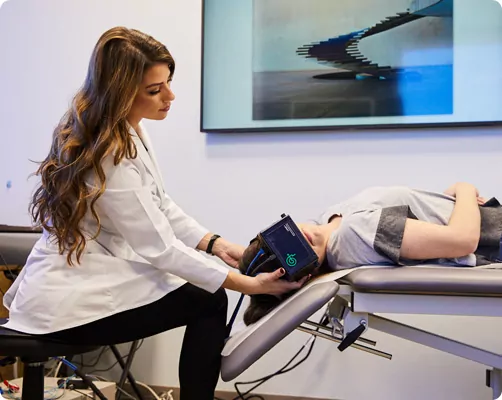Top Medicines Prescribed for Vertigo Relief: What Operates and Why
Top Medicines Prescribed for Vertigo Relief: What Operates and Why
Blog Article
Vertigo is just a frequent issue that influences huge numbers of people worldwide. It's indicated by a sensation of dizziness, spinning, or sensation off-balance. While vertigo could be caused by various facets, pinpointing the main trigger is vital in deciding the most effective therapy plan. In that article, we will discuss why it is important to spot the what causes vertigo efficient treatment and how it may increase your general quality of life.

Vertigo could be due to several facets such as for example internal ear issues, head accidents, migraines, and actually certain medications. Without understanding the main cause of your vertigo symptoms, it can be tough to get a proper treatment that will give long-term relief. For instance, if your vertigo is due to an interior ear issue but you're given medicine for migraines alternatively, you might not knowledge any development in your symptoms.
Determining the explanation for vertigo needs a thorough evaluation from the medical professional. This may contain bodily exams and diagnostic tests such as for instance blood work and imaging tests to eliminate any underlying problems or injuries that could be creating your symptoms. When the trigger has been determined, a customized therapy plan may be made to deal with your particular needs.
One reason why identifying the explanation for vertigo is important for effective therapy is basically because various triggers require different approaches in handling symptoms. As an example, if your vertigo is due to an interior ear problem named benign paroxysmal positional vertigo (BPPV), unique workouts referred to as canalith rethinking maneuvers will help relieve symptoms. However, these exercises would not be useful if your vertigo was caused by something else like vestibular neuritis.
Furthermore, managing only the observable symptoms without handling their real cause may lead to temporary reduction however, not long-term development in overall health and well-being. As an example, using medicine to alleviate vertigo symptoms brought on by an inner ear problem may possibly offer temporary relief, but it does not address the main issue. This could result in continuing attacks of vertigo and a lowered quality of life.
Identifying the reason for vertigo can be important in preventing potential symptoms and controlling any potential complications. As an example, if your vertigo is caused by a head harm, pinpointing it early on can reduce further damage and enable proper therapy to be administered promptly.

Realization: To conclude, identifying the reason for your vertigo is essential for successful therapy and overall well-being. It enables a personalized strategy that addresses the basis cause somewhat than just treating symptoms. With correct examination and treatment, you are able to experience long-term relief from your indicators and boost your quality of life significantly. If you're encountering frequent symptoms of vertigo and other connected symptoms, don't wait to find medical interest to find out the main cause and get suitable treatment.
________________________________________
Medication vs. Treatment: What's Most readily useful for Managing Vertigo?
===============================================
Vertigo is just a common situation that influences thousands of people worldwide. It is indicated by way of a experience of dizziness, rotating, and lack of balance. While there are various triggers for vertigo, it can be debilitating and considerably impact one's quality of life. Luckily, you can find medicines available to simply help relieve the symptoms and offer comfort for those struggling with vertigo. In that article, we shall examine the various kinds of vertigo medication comfort and why they work.

The absolute most commonly recommended treatment for vertigo is called Meclizine (Antivert). That treatment goes to a class known as antihistamines which work by blocking histamine receptors in mental performance responsible for creating dizziness and nausea. Meclizine has been found to work in reducing signs such as for example dizziness, vomiting, and sickness related to vertigo. It's usually taken 1-4 instances daily with regards to the extent of symptoms.
Another kind of medicine used to deal with vertigo is called Benzodiazepines (Valium or Ativan). These drugs behave on specific neurotransmitters in mental performance that regulate stability and coordination. They have been found to work in lowering emotions of dizziness and nervousness associated with vertigo. However, these medications could cause drowsiness
as a side-effect so they should be used with caution.
Sometimes where different drugs haven't presented comfort or if you will find main conditions creating vertigo such as Meniere's condition or vestibular migraines, doctors may prescribe diuretics like hydrochlorothiazide (HCTZ) or acetazolamide (Diamox). These drugs perform by reducing water escalation in the inner hearing that may subscribe to attacks of vertigo.
For many who knowledge significant bouts of vertigo that do not respond well to other medications, health practitioners might prescribe steroids such as for instance prednisone. These drugs perform by lowering irritation in the internal head which can trigger vertigo. Nevertheless, they're frequently recommended for short-term use because of possible area effects.
As well as these medications, health practitioners might also recommend vestibular rehabilitation treatment (VRT) for long-term respite from vertigo symptoms. VRT is a questionnaire of physical therapy that targets exercises and techniques to enhance balance and reduce dizziness. It's been found to be effective in controlling vertigo indicators and increasing over all quality of life.

Conclusion: While there's no one-size-fits-all approach in regards to treating vertigo, medications provides significant comfort for anyone suffering from that condition. Meclizine, Benzodiazepines, diuretics, steroids, and VRT are all generally prescribed alternatives which have been discovered to work in managing vertigo symptoms. It is essential to consult with a doctor before starting any medication regimen as they could establish the best course of therapy centered on specific needs and medical history. Report this page